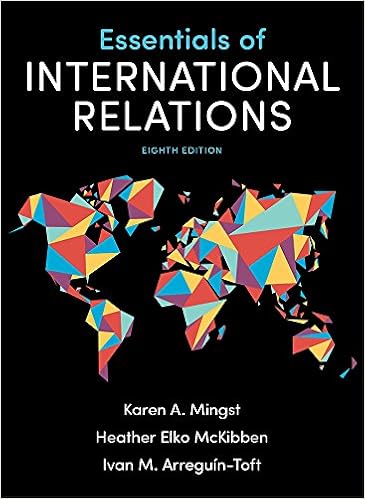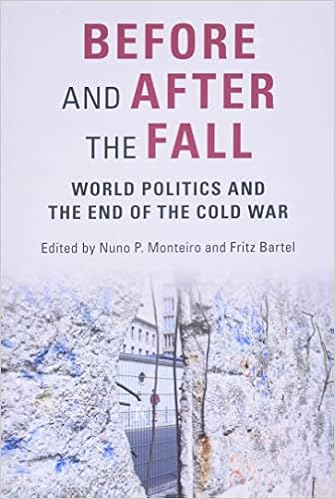Top 8 International Relations Books For 2022
There are a number of great books on international relations, but it can be hard to know where to start. Reading about foreign policy is a great way to develop an understanding of the complexities of the field. If you are looking to learn more about the Russia-Ukraine war check out the following article.
The major objectives of a country are the guideposts for its internal activities and social relations with other nations. The development of foreign policy is determined by domestic factors, the policies of other states, or the pursuit of specific geopolitical designs.
The United States uses four key foreign policy instances to pursue its goals. These are
- the protection of U.S. citizens,
- the maintenance of access to key resources and markets,
- the balance of power in the world, and
- protection of human rights and democracy.
Foreign Policy Books Worth To Read
However, with so many books on the topic, starting from Sun Tzu's The Art of War it can be difficult to know where to start. To help you get started, here are five of the best international relations books.

Red-Handed: How American Elites Get Rich Helping China Win, by Peter Schweizer (2022)
Peter Schweizer book became an instant best seller on Amazon, we also created a short summary about the findings the author did in this enlightening book.
The author highlights the dangerous game many of our politicians are playing with China. From Bidens to Bushes and McConnells to Pelosis, they are taking money in efforts to affect American politics in China's favor and helping China with its primary intention. Becoming the top economy of the world, within 50 years! Their goal is to dominate economically, technically, and militarily.

Essentials of International Relations, by Karen A. Mingst Et al. (2018)
Essentials of International Relations is a quick, yet highly informative, introduction to the main concepts in international relations. The author lays out the basic rules of analysis-the individual, society, and the socioeconomic system-and demonstrates how the main schools of thought-liberalism, realism, and Marxism-adapt these tools to analyze the interactions between nations, paying particular attention to security and economic issues.
The author provides numerous examples and case studies of theory in action. In addition, the author explores the relationship between international law and the development of non-governmental organizations while clearly building an clear structure through which it is possible to contemplate the new world order.
This is the 8th edition of this popular Karen A. Mingst book. The book is excellently written and includes everything that you want to know to understand foreign policy. This is one of the essential international relations books.

The Long Game: China's Grand Strategy to Displace American Order, by Rush Doshi (2021)
Though Xi Jinping is the mouthpiece of the Chinese Communist Party at present. There are elements that are deeper and more deep-seated than a mere opportunistic or transient rise in Xi’s profile and direction. We can figure out the possibility that Xi covertly and subconsciously represents an organized and self-reinforcing, ambitious framework that is more lasting. Perhaps more threatening in the long term, than the head of Chinese Communist Party.
In Doshi's opinion, Xi's policies, such as standing up against the United States, breaking international agreements pertaining to Hong Kong, militarizing islands in the South China Sea, threatening Taiwan and locking up hundreds of thousands of Uyghurs in Xinjiang. And on the foreign front, Doshi seems to argue, the main objective is to rule the power of United States.

Strategy: A History, by Sir Lawrence Freedman (2013)
The world's leading expert on the nexus of war and international politics relays the rich history of strategy. In Strategy: A History, imparting a consistently engaging and enlightening account of how strategy has permeated every aspect of our lives.
Nearly all the information in Freedman's book is concrete, discovering tactics and strategies from primate groups, The Iliad, Sun Tzu's The Art of War, Machiavelli, and Jomini. Avoiding unwanted circumstances, Freedman demonstrates that chance games offers strategy with its problem and drama. Fretting over fate in political arenas is unlikely, since no army, government or nation tends to leave behind a sure path to a given goal.
An insightful review of the most dominant theories in history.

World Politics: Interests, Interactions, Institutions, by Jeffry A. Frieden Et al. (2018)
World Politics teaches us the key concepts for understanding international relations. In the updated 4th edition of this book, new Controversy units apply the concepts in each chapter to evidence of real-life events and situations.
This book also gives historical background explaining the different eras and key events in Europe and later in U.S. Including the Warsaw Pact, establishment of NATO, Cold War, World War I and II.
This book is suitable for students, hence with it's hefty 637 pages readers are free to pick their favorite parts of this edition.

Atomic Steppe: How Kazakhstan Gave Up the Bomb, by Togzhan Kassenova (2022)
The author highlights the story about how an obscure country of Kazakhstan stubbornly declined the world's most fearsome weapon. Because the fall of the Soviet Union, an underdeveloped Central Asian country unexpectedly found itself in possession of thousands of nuclear weapons on its territory.
This book is taking us on a journey into the unknown nuclear history of Kazakhstan. What this poor country did exactly with it's nuclear inventory?
With thousands of nuclear weapons still present around the world, how Kazakhs relinquished their nuclear inheritance represents an urgent warning about global security.

Before and After the Fall: World Politics and the End of the Cold War, by Nuno P. Monteiro (2021)
US President George H. W. Bush's historic view of the end of the Cold War in 1991 was a precursor to the development of a new regime based on liberal democratic capitalism.
Thirty years after, China is on the rise, Russia revived, it's also clear that the Bush proclamation is still unfulfilled. Those who write about global issues today reveal why hopes of the early 1990s did not meet expectations and the challenges ahead.
This is one excellently written example of foreign polity books today. Gives not only background but hints what the future may hold to us.
Conclusion: International Relations Books
International relations books can provide readers with a new perspective on global events. As the World War II passed we thought there would be no further agression in the modern countries, but the Russian Ukraine war started on the 24th of February 2022 proved that the dark days is still not over. By reading about the theories and practices of different countries, individuals can develop a better understanding of international relations.
Furthermore, these books can serve as a resource for students and professionals who are interested in pursing a career in international affairs. Finally, I encourage everyone to read one or more international relations books to gain a deeper understanding of our complex world.
If you want to discover social issues in our society, check our curated list of books on social issues.
My profession is online marketing and development (10+ years experience), check my latest mobile app called Upcoming or my Chrome extensions for ChatGPT. But my real passion is reading books both fiction and non-fiction. I have several favorite authors like James Redfield or Daniel Keyes. If I read a book I always want to find the best part of it, every book has its unique value.







